- Home
- Mack Reynolds
Day After Tomorrow Page 6
Day After Tomorrow Read online
Page 6
“Yes, yes of course. But I have not heard of this organization of which you speak.” His tone of voice was almost apologetic. Ilya Simonov made a mental note to have the ambassador looked into. He appeared and sounded as though he had something on his mind.
He thought about it for a moment, then said, “How many KGB men do you have assigned here?”
“Three, all military attaches.”
“Have I been assigned an office?”
“Unless I am mistaken, it is part of your suite.”
Ilya Simonov stood. He said, “Would you be so kind as to ask them to report to me there?”
“Of course,” the ambassador said. He seemed relieved to see his awesome caller departing. “Will my wife and I have the pleasure of your company at dinner tonight?”
“I doubt it,” Simonov said. “I’ve got to plow into this immediately. I have old friends here in Greater Washington in the C.I.A. and the F.B.I., among other organizations, and it’s just a matter of time before they stumble on the fact of my presence. I have no doubt but that this embassy is either bugged or that we have American agents on our staff—or both. Some opinion to the contrary, they are not necessarily incompetent.”
The ambassador did his best to hide the fact that his invitation being refused did not completely displease him.
Up in his suite, behind his desk, Ilya Simonov ran his eyes over the three Committee of State Security men. He knew none of them but that didn’t surprise him. He hadn’t operated in the United States for a decade, and there were tens of thousands of KGB men on this level. They knew him, however. Or, at least, they knew of him. And they, like the ambassador, were slightly queasy in his presence.
He didn’t offer them seats.
He told them the same story as he had the ambassador and received in return the same blankness.
He glowered at them. “Do you mean to tell me that you, three trained KGB men, are assigned to this country and don’t even know of subversive organizations here?”
One of them, his name was Mikhail Aristov, if Simonov recalled correctly, said anxiously, “There are a good many organizations in America that are considered subversive, Comrade Colonel. There is, of course, our Communist Party, which is not very strong in the United States, and the Mao Communist Party which is even smaller. There is the Socialist Labor Party, the oldest of the radical parties in this country, going back to before 1900. There are the Socialist Workers Party, who are Trotskests. There is Socialist Reconstruction. There is the Progressive Party. And there is the IWW, the Industrial Workers of the World, a union rather than a political organization. Then there is—”
Simonov held up a hand. “This is not a Marxist group that I am investigating.”
One of the three said, “Then it is a right wing organization? Something like the John Birch Society or the Ku Klux Klan?”
Ilya Simonov shook his head in irritation. “We don’t know. All we know about them is that they are trying to increase the efficiency of the Yankee socioeconomic system. And that, obviously, is not to our interest.”
He took them in and said slowly, “Now here are your instructions. Get out and locate some of these people, however you can. Find out the details of just what it is they want. Find out how they expect to obtain their goals. Find out the names of the top leaders, their theoreticians and so forth. You’ll have to be my legmen. I don’t dare leave the embassy grounds. I might be spotted. We can put off, for a time, undoubtedly, my having to go through the red tape of accreditation, but when this does come up, undoubtedly they will be upon me and refuse my presence in the country.”
After they had left, Ilya Simonov sat there for a long moment. Finally, he looked up a number and dialed it on the phone. The screen didn’t light up, but he had expected that.
A heavy Teutonic voice said, “Ah, Colonel Simonov, I had heard that you were in the country. Rather bold of you, wouldn’t you say?”
Simonov growled, “Don’t try to impress me with your efficiency, Herr Distelmayer. You know very well that you didn’t know I was here in America.”
The German chuckled without humor. “You entered by supersonic from England. You have a diplomatic passport under the name Alex, rather than Ilya. You are supposedly a new military attache for your embassy.”
Ilya Simonov didn’t like it. If Distelmayer’s organization had already cracked his cover, there was no reason why the Americans couldn’t as well, and he needed time.
He said, “And why am I really here?”
For once, the German spy master’s voice was puzzled. “That I don’t know, my friend. Tell me, why?”
Ilya Simonov said, obviously reluctantly, “Ordinarily, we don’t like to use your services, Hans Distelmayer, but on this occasion I am afraid time might be of the essence, and you have a large organization.”
“Yours to command,” the other said jovially.
Ilya Simonov told him the purpose of his visit, mentioning the fact that neither the ambassador nor his three KGB men had ever heard of the organization in which Minister Blagonravov was interested.
“Where did Blagonravov hear about it?” the German spy master said interestedly.
“I don’t know. The Minister has a good many irons in the fire.”
When Simonov had finished the German held silence for a moment, then said, “Interesting situation. That is, your government’s involvement. Very well, I shall have a report for you shortly. If you have been apprehended by then, or have flown the country by that time, where shall I send it?”
“Directly to the Ministry in Moscow.”
“Very well. And payment, Colonel?”
“The usual. In gold, from Moscow, to your offices in Basel, Switzerland, immediately upon the receipt of your bill. But speed is important, Distelmayer.”
“It usually is,” the other chuckled.
X
Steve Hackett rubbed the end of his pug nose irritably. He looked up and down the street, before going into the underground. He couldn’t see anyone he knew, so down he went into the public transit system. Like Larry Woolford, he knew it wasn’t the thing to do in this status-conscious town, but he had left his car with Ruth that morning, her own being in the garage.
He took the subway to Alexandria and stared morosely out the window, though there was nothing to see in the tunnel. Steve Hackett was very unhappy.
He had done everything he could think of to do, and had assigned half a dozen others to assist him.
They had checked out every stoolpigeon within a fifty mile radius, men who had fingered pushers for them before. The world of the counterfeiter is small and its inhabitants even more prone to be susceptible to official pressure than other criminal elements. You caught a lower echelon pusher, made a deal with him to escape prosecution, freed him and then for the rest of all time you could twist his arm when you needed information. It was a dirty way to handle the business, perhaps, but no one had ever figured out another way.
His men had brought in a score of these contemptable informers. They had been worthless.
He remembered the first one. A stoolie who would probably wind up dead one of these days. He had been informing on his colleagues for some ten years now. It was a typical case. The other was still pushing himself; he probably knew no other manner of making a living, had probably been doing it from youth—whatever kind of youth he might have had. Steve took it easy on him. It was much better to have a pusher netting possibly a hundred dollars a week in your pocket and to have an informer who might finger for you the next echelon up, or two echelons, than to have him in prison. Hell, you could always throw him into prison if he became worthless to you so far as seeking out his superiors was concerned.
When the informer had entered his office, Steve had been even colder than usual. He had ignored the hand the other had hesitantly extended. Steve’s ugliness was an attribute in his trade. He wasn’t, but he had the reputation of being the most vicious, cold-blooded agent in Secret Service. People were afraid of him.<
br />
“Sit down,” he said.
“Yeah, sure.” The other’s name was Mike Edmonds. Steve had caught him, initially. The fool had been spending some of the crudest five dollar bills Steve had ever seen. The only reason he had survived at all was that he made a practice of passing the bills only in a very dim atmosphere—bars, dimly-lit restaurants, taxi-cabs, whorehouses; or sometimes in markets, at stands owned by immigrants, those less acquainted with the currency than the average.
More recently, Steve knew, Edmonds had been trying a new angle. He was pushing tens. He’d start off at about one o’clock in the morning and made the round of the cheaper bars down in the port area. He’d strike up an acquaintance, buy the other a drink, fish into his wallet and say, “Hey, you wouldn’t have two fives for a ten would you? I got this broad I’m screwing regular and always slip her a fiver, but if I didn’t have a five, I’d have to wind up giving her a ten.”
It usually didn’t occur to the sucker to suggest that Edmonds ask the bartender for the change, at this time of the morning he was too far gone. If he had two fives, they usually were passed on for the phoney ten. There were so many bars of this type in the area that Edmonds could keep on operating indefinitely.
But Steve wasn’t basically interested in Mike Edmonds. Not at this stage, at least. He knew where Edmonds stood. On the lowest rungs of the ladder. If the other—who wasn’t completely bright, or he wouldn’t be in this sucker game—graduated to the higher counterfeit echelons, then Steve would move in on him. But now? He was of more value as a stoolie than he would be in jail, where he belonged.
Steve eyed him now, very coldly.
Edmonds said nervously, “What’s up… Steve?”
“Mr. Hackett.”
“Oh, yeah, well, sure. But the last time I seen you we was calling each other by first names.”
Steve Hackett eyed him coldly for a long, long moment, and the other became increasingly nervous.
Steve said finally, “I gave you a break ten years ago, Edmonds. I’ve given you more than one other break, down through the years. How much time have you spent in the slammer, since I’ve been cooperating with you, giving you breaks you don’t deserve?”
Mike Edmonds licked nervous lips. “Only a year or so… Mr. Hackett.”
“Right. And now that something big has come up, you lay low.”
“Something big… Mr. Hackett?”
“Don’t give me that crap, Edmonds. If anybody in the racket would know, you would. There’s not a man in this town who knows more about pushing green goods than you do.”
The other wiped a moist hand over his mouth nervously. He knew very well that the man across the desk could send him over for as much as twenty years.
He stuttered, “I don’t know what you’re talking about, Mr. Hackett. You know I’ve always cooperated with you, like. I got a hard time these days. The old lady’s sick and all, and—”
“Listen, I don’t have my violin with me, Edmonds, or I’d be glad to play some sad gypsy music for you.”
“Look, Mr. Hackett, I don’t know…”
Steve Hackett pulled out a drawer and brought forth a fifty dollar bill, one of those he had taken from Susan Self. He handed it over.
Mike Edmonds was now on his own grounds. He looked at it carefully. In particular he looked at the eyes of the portrait. He rubbed the bill between his fingers to get the texture. He held it up the window, to peer through the composition of the paper. Finally, he looked up at the man who could send him to prison for the rest of his life, or, at least, that portion of it that made any difference.
He shook his head definitely. “This here ain’t green goods, Mr. Hackett.”
“It’s queer as chicken shit.”
The counterfeit passer’s face went blank and he looked at the bill again, carefully, fully. Steve Hackett held his peace.
The other shook his head again, again definitely. “If it is, I never seen nothing like it.”
“Where’d it come from?”
Edmonds stared at him. “How would I know? I still don’t think it’s queer. I never seen nothing like this. I been around a long time, Mr. Hackett. I never seen any queer like this—if it’s queer.” He had enough animal courage to stick to his guns in his own field.
Steve sighed. “All right, Mike. I tell you this. You tell me where these half-a-bill things are coming from before the week is out, or into the slammer you go. You know how much I’ve got in my files on you. As a matter of fact, you don’t. I’ve got more than you know about. I can send you over, Mike, for the rest of your days.”
“Listen, Mr. Hackett. I got a wife and two kids.”
“Those kids will be orphans unless I know where those fifties came from before the week is out.”
The counterfeit pusher stared at the bill, which he had returned to the surface of the desk. He shook his head. “Could I take it along, for a sample?”
Steve said, “You smart-assed son of a bitch. You’d pass it at the first bank you came across. It’s perfect.”
“Yes, sir, that’s what I’ve been telling you. Is it all in fifties? The boys don’t run off much fifties.”
Steve Hackett said, “We’ve only seen the fifties, but we’ve been told there are also fives, tens and twenties.”
Mike Edmonds came to his feet. “I’ll circulate around, Mr. Hackett and see what I hear. But you wanta know something?”
“What?”
“I don’t think any of the regulars are turning this green goods out. It’s gotta be somebody new. Somebody with a lot of, like resources, not some guy down in a cellar with his own engraving outfit and a platen press.”
Steve Hackett had stared after him, when the other had left, with a feeling of frustration. He didn’t know why, but he was inclined to agree with the little pusher’s final statement. He called for the next stool pigeon, and drew another blank. And another. There seemed to be no question about it. The counterfeit pushing professionals in the Greater Washington area knew nothing about this job.
He tried to track down the ink. If Susan Self was even partially right about the amount of phony money she had seen, it would have taken a great deal of the type ink involved to have printed it. But he drew a big round zero on the ink.
He tried to track down the source of the paper.
The type paper utilized was identical to that used by the government in printing real money. It was of a quality never used for other purposes. If Susan was right, that there were rooms and rooms of the fake dollars, then tons of expensive paper were involved. But he drew another blank. He could find no records of paper of this type being sold to any source save the government printing plants of the Treasury. Could it have come from abroad? But, if so, where? He had no manner in which to check foreign paper manufacturers. Besides, if it had originated in some other country, how had the counterfeiters got it over the border? It’s one thing smuggling a suitcase full of contraband, but tons?
Now, on the subway, he shook his head in despair. Of course, there was always the possibility that, although the counterfeit money was now here in Washington, that this was basically an out of town operation. He had sent men to New York, Chicago and Los Angeles to check with local police and further stoolies, but he had a strong intuition that they were not going to do any better in those cities than they had here.
In Alexandria, he left the public transport system tube at the station nearest to his house, and set out on foot. It was an older part of town and in its day had been the proudest section of the city. He loved it for its relative quiet, its relatively little traffic, the large trees which lined the streets, the quaint oldness of the mansions.
He strode up the steps of his home, crossed the porch and allowed the identity screen on the door to pick him up. He had hated to have the device installed in the beautiful, heavy door, but Ruth had insisted. Everybody, but everybody, had identity screens on their doors. They’d be the talk of the neighborhood if they didn’t have one. He wouldn’t want to
get the reputation of being a weird, would he?
The door opened automatically before him and he went on in, down the hall and to the living room.
Ruth was sitting there, her mouth pursed. He recognized the expression from of old. Something was on her mind that she feared he wasn’t going to like and she was getting into a frame of mind for the fray.
Ruth was a tall girl with every pore in place. Her hair was in the very latest style from Budapest, hair style center of Europe, this year. Her make-up was perfect, which was to be expected, he reflected glumly, in view of the time she spent at it. Her clothing was the most chic available from Copenhagen. Scandinavian styles were all the thing this year. The French and Italian dressing houses must be starving to death.
He said, “Hello, darling. Sorry I’m a little late this evening. We’re on a big case. Probably the biggest one I’ve ever seen.” He went over to the auto-bar. “How about a drink? I could use one.”
She shook her head, and said, “Steve, there’s something I have to talk to you about.”
“All right.” He dialed for a vodka martini, telling himself grimly that he was going to learn to like to drink the damn things if it killed him,
“Ben and Tessy were here this afternoon.”
“Oh?” He brought the drink back and sat down on the couch beside her. “What did they have to say?”
“It wasn’t what they said. It was their attitude,” she said, and her mouth pursed again.
He fixed his eyes on her but held his peace.
She said, “They’ve recently moved into a new apartment in the Druid Hill section of Baltimore. It’s the name area now. Just everybody is moving there. You’re simply not with it, these days, unless you live near Druid Hill Park.”
“I don’t like Baltimore,” he muttered.
“What’s that got to do with it? Steve, we’ve simply got to take an apartment there. Houses have become old hat. We’ll be nobodies unless we move to a Baltimore apartment.”
“Those damn plastic and glass fish bowls? Good God, Ruthie, this house is comfortable. It has that lived-in feeling. The rooms are large, the furniture comfortable. The climate is relatively nice here. The neighborhood’s quiet. Most of the neighbors are old families; they’ve known we Hacketts for generations. Known us, respected us, liked us. It’s something you can’t buy. We have a pride of place here. It’s our turf.”

 Happy Ending
Happy Ending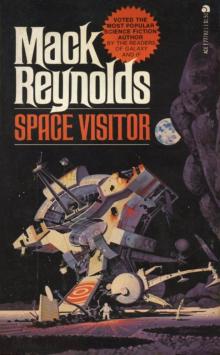 Space Visitor
Space Visitor A Kiss Before Loving
A Kiss Before Loving Episode on the Riviera
Episode on the Riviera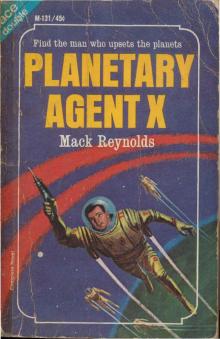 Planetary Agent X
Planetary Agent X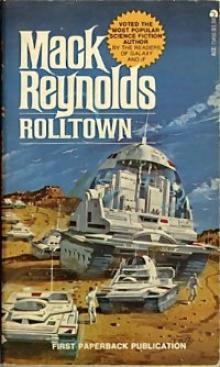 Rolltown bh-3
Rolltown bh-3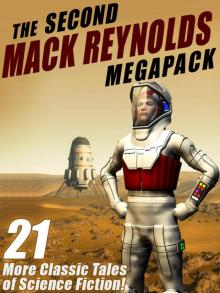 The Second Mack Reynolds Megapack
The Second Mack Reynolds Megapack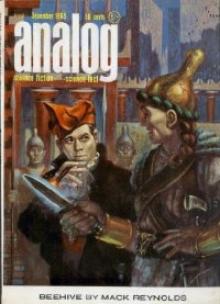 Dawnman Planet up-2
Dawnman Planet up-2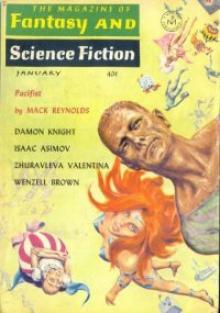 Pacifist
Pacifist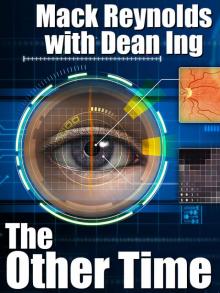 The Other Time
The Other Time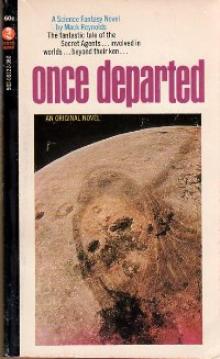 Once Departed
Once Departed IQ
IQ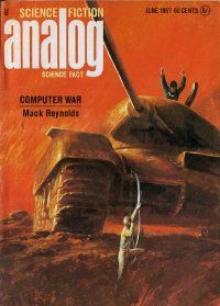 Computer War
Computer War Earth Unaware
Earth Unaware The Rival Rigelians up-3
The Rival Rigelians up-3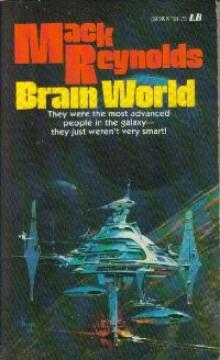 Brain World up-7
Brain World up-7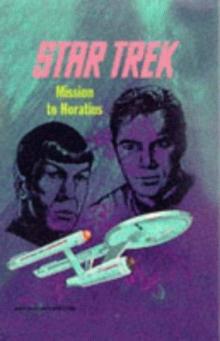 Star Trek - TOS - Mission to Horatius
Star Trek - TOS - Mission to Horatius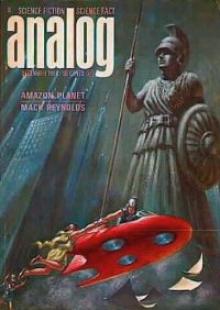 Amazon Planet up-5
Amazon Planet up-5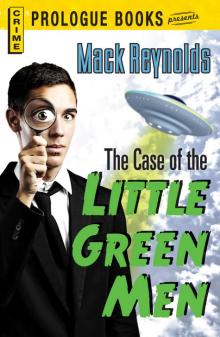 The Case of the Little Green Men
The Case of the Little Green Men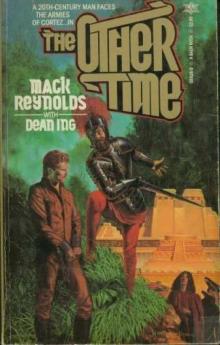 Other Time
Other Time The Mack Reynolds Megapack
The Mack Reynolds Megapack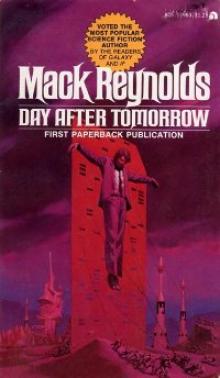 Day After Tomorrow
Day After Tomorrow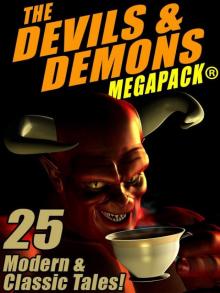 The Devils & Demons MEGAPACK ®: 25 Modern and Classic Tales
The Devils & Demons MEGAPACK ®: 25 Modern and Classic Tales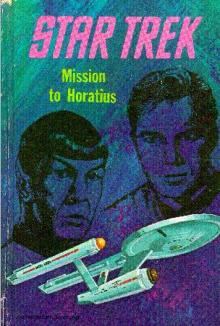 Mission to Horatius
Mission to Horatius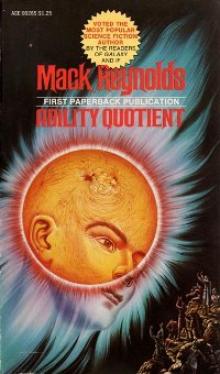 Ability Quotient
Ability Quotient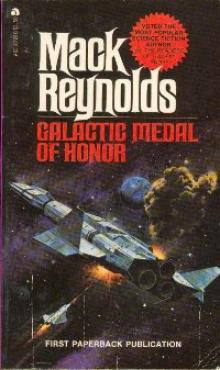 Galactic Medal of Honor
Galactic Medal of Honor Trojan Orbit
Trojan Orbit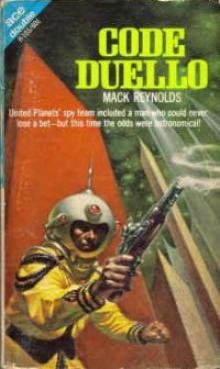 Code Duello up-4
Code Duello up-4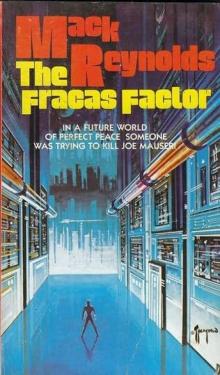 The Fracas Factor
The Fracas Factor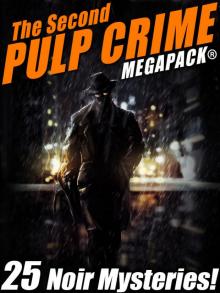 The Second Pulp Crime
The Second Pulp Crime Deathwish World
Deathwish World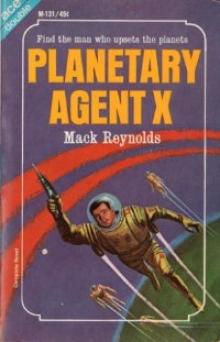 Planetary Agent X up-1
Planetary Agent X up-1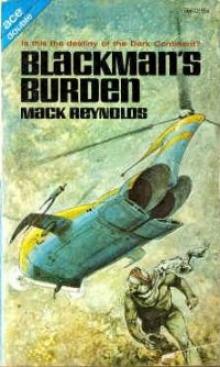 Blackman' Burden na-1
Blackman' Burden na-1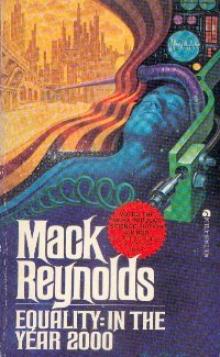 Equality: In the Year 2000 jw-2
Equality: In the Year 2000 jw-2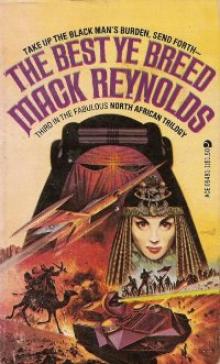 The Best Ye Breed na-3
The Best Ye Breed na-3 The Jet Set
The Jet Set The Rival Rigelians
The Rival Rigelians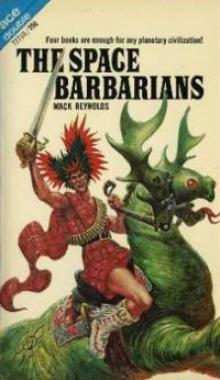 The Space Barbarians
The Space Barbarians